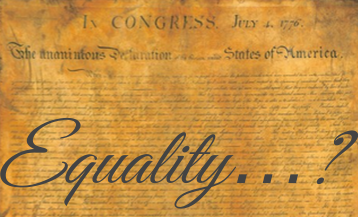What Is That Something? Part 2
Again this week, the headlines have been bombarded with more news of ISIS attacks and counterattacks. And our question from last week remains unanswered - what is that something that makes the US different from the war-torn Middle East?
After a brief look at the Constitution and the Declaration we determined that those documents are not what truly make the difference. Even though they are great historical works with more importance today than ever, they sadly are not a bandage that can just be used to try and mend the gaping wound of unrest and war that the Middle East suffers from.
It was decided we must look back further to find that something. The Constitution and the Declaration were the fruit of seeds planted long before 1776. John Adams, an eyewitness and authority on the subject, said,
“The Revolution was effected before the war commenced. The Revolution was in the minds and hearts of the people; a change in their religious sentiments of their duties and obligations….This radical change in the principles, opinions, sentiments, and affections of the people, was the real American Revolution.”
In the letter I’m quoting from here (read the full letter here), Adams named several men who he believed were the foremost instigators of the Revolution and among the men named, he listed several pastors and pointed to specific sermons that were instrumental in this “radical change”. To a true student of American history this fact will not come as a surprise.
 |
| One of the men Adam's attributed the Revolution to - Dr. Jonathan Mayhew |
Adams goes on to say, “[T]he principles and feelings which contributed to produce the revolution….ought to be traced back for two hundred years, and sought in the history of the country from the first plantations in America….”
I do not believe Adams was speaking of Jamestown here. His description does not fit the greed and disregard of principle demonstrated by the early founders of Jamestown. No, his description is more along the lines of Plymouth, founded by the Pilgrims in 1620.
 |
| The Pilgrims |
What were these principles and feelings that the patriots of our founding era learned from their forefathers? Adams listed them in his letter: “....a solid, immutable, eternal foundation of justice and humanity;...a people possessed of intelligence, fortitude, and integrity sufficient to carry them with steadiness, patience, and perseverance, through all the vicissitudes of fortune, the fiery trials and melancholy disasters they may have to encounter.”
That is what sets America apart. That is the something. An unchanging foundation of justice, humanity, intelligence (independent thought), fortitude (courage), integrity (strong moral principles), steadiness, patience, and perseverance.
Where did these principles come from? And why do they seem so out of reach for war-torn countries and those in the throes of unrest? I’ll let the Founding Fathers tell you in their own words.
John Hancock, “Sensible of the importance of Christian piety and virtue to the order and happiness of a state, I cannot but earnestly commend to you every measure for their support and encouragement.”

Noah Webster, “No truth is more evident to my mind than that the Christian religion must be the basis of any government intended to secure the rights and privileges of a free people.”
Benjamin Rush, “[T]he only means of establishing and perpetuating our republican forms of government is the universal education of our youth in the principles of Christianity by means of the Bible.”
I’ll end with a quote from America’s Father, George Washington, “Of all the dispositions and habits, which lead to political prosperity, Religion and Morality are indispensable supports. In vain would that man claim the tribute of Patriotism, who should labor to subvert these great pillars of human happiness, these firmest props of the duties of Men and Citizens. The mere Politician, equally with the pious man, ought to respect and to cherish them. A volume could not trace all their connections with private and public felicity. Let it simply be asked, Where is the security for property, for reputation, for life, if the sense of religious obligation desert the oaths, which are the instruments of investigation in Courts of Justice? And let us with caution indulge the supposition, that morality can be maintained without religion. Whatever may be conceded to the influence of refined education on minds of peculiar structure, reason and experience both forbid us to expect, that national morality can prevail in exclusion of religious principle.”
Jonathan Paine
@painefultruth76
painefultruth76.blogspot.com






Comments
Post a Comment